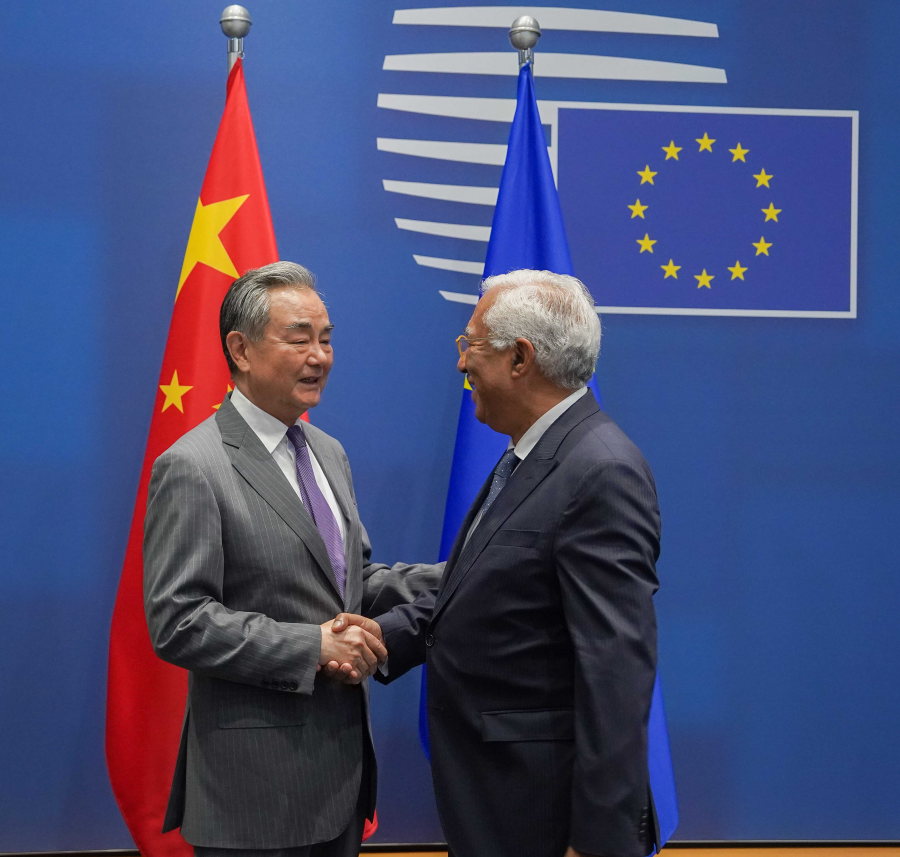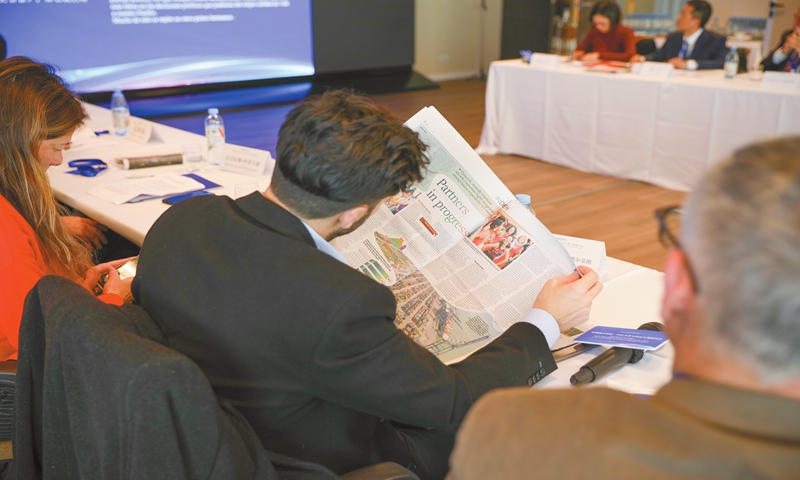Wang Yi meets EC President Costa, calls for enhancing understanding, mutual trust

China's top diplomat Wang Yi on Wednesday met with European Council President António Costa. Wang called for enhancing understanding and mutual trust, adding that the more severe and complex the international situation becomes, the more China and Europe need to strengthen unity and coordination, firmly serving as stabilizing forces in a turbulent world.
China and the European Union (EU) are due to hold their 13th Strategic Dialogue on Wednesday in Brussels, according to an EU press release and local media reports.
During his meeting with European Council President António Costa on Wednesday, Chinese Foreign Minister Wang Yi said that at the beginning of this year, President Xi Jinping had a phone call with Costa, marking the start of the celebrations for the 50th anniversary of the establishment of diplomatic relations between China and EU.
Both sides agreed to uphold the partnership, pursue mutually beneficial cooperation, safeguard multilateralism and properly handle differences, setting the direction for China-EU relations, Wang said.
Wang said that China views Europe as a key pole in a multipolar world and maintains consistency and stability in its Europe policy. Regardless of Europe's circumstances, China firmly supports European integration and welcomes the EU's efforts to enhance strategic autonomy and play a greater role on the international stage.
China is ready to strengthen communication and coordination with the EU, prepare for the next leaders' meeting, and open up new prospects and inject new momentum into the comprehensive strategic partnership, Wang added.
Wang said that today's world is intertwined with changes and upheaval, with unilateralism and acts of bullying severely impacting the international order and rules. As two major powers and two major economies, China and Europe adhering to dialogue and cooperation prevents the formation of bloc confrontations; China and Europe choosing openness and mutual benefit ensures that the tide of economic globalization will not be reversed; China and Europe jointly practicing multilateralism keeps the world from descending into chaos.
The more severe and complex the international situation becomes, the more China and Europe need to strengthen unity and coordination, firmly serving as stabilizing forces in a turbulent world. It is essential to truly respect each other's core interests, enhance understanding and mutual trust, and achieve mutual success to bring light to the world, Wang noted.
Costa said that this year marks the 50th anniversary of the establishment of diplomatic relations between EU and China, providing an important opportunity for further development of their relationship. Both Europe and China support multilateralism, and in a world with increasing uncertainties, both sides bear the responsibility to jointly send clear and strong signals on critical issues, injecting stability, confidence, and positive expectations into the world.
While there are differences between Europe and China, the European side is willing to work with the Chinese side in a spirit of mutual respect, to transcend differences, enhance understanding, and join hands in addressing global challenges. Europe looks forward to concerted efforts from both sides to ensure the success of the next Europe-China leaders' summit. The EU will continue to firmly adhere to the One-China policy, Costa said.
Wang is touring Europe from June 30 to July 6. He will make stops in Brussels at the EU headquarters before heading to Germany and France. Prior to the engagement with the bloc, Belgian Prime Minister Bart De Wever met with Wang on Tuesday.
Marking the half a century of ties between China and the EU, Wang's visit, which includes not only the EU headquarters but also the bloc's two core member states, highlights that China-EU relations stand at a critical juncture. If both can properly manage existing issues, their relationship is poised to grow stronger and closer; failure to do so, however, risks triggering prolonged friction in areas such as trade and tariffs. At this pivotal moment, direct high-level engagement is particularly crucial, Zhao Junjie, senior research fellow at the Institute of European Studies at the Chinese Academy of Social Sciences, told the Global Times on Wednesday.
The last high-level strategic dialogue between China and the EU took place in 2023. This meeting marks the first round of communication on strategic security issues and the macro-level framework of China-EU relations since the transition of the European Commission. It is expected that the Chinese side will adopt a more direct and candid approach to express its commitment to safeguarding shared interests, Dong Yifan, an associate research fellow at the Belt and Road Academy of Beijing Language and Culture University, told the Global Times.
Shifting global dynamics, particularly the Trump administration's "America First" policy, which has strategically sidelined Europe, have given the EU greater room to pursue strategic autonomy, Zhao said.
Yet, the future trajectory of China-EU relations remains fraught with uncertainties, the expert noted. On one hand, US influence is still disrupting Europe's policy choices. On the other, the rise of far-right forces within Europe could introduce new variables. Against this backdrop, the current high-level dialogue represents an opportunity to steer relations toward a more stable path, Zhao noted.
Ties between China and the EU are still facing a number of complexities, and over the past few months, the European Commission has been wavering on just how tough its stance on Beijing should be - a wobbly position that has left businesses scratching their heads, Euractiv reported.
The issue of rare earths has recently drawn widespread attention. The European side has complained that a decline in rare earth exports from China is affecting European businesses "very, very badly." During the G7 Summit in Canada, European Commission President Ursula von der Leyen even brandished a rare earth magnet, accusing China of "weaponizing" rare earths and calling on "like-minded partners" to join forces to counter the so-called "China shock."
Yet in May, the EU leader said the bloc is "willing to deepen its partnership with China, strengthen exchanges and cooperation, uphold the purposes and principles of the United Nations Charter, jointly tackle common challenges and promote world peace, security, prosperity and sustainable development."
Dong noted that while Europe recognizes its need for China amid global turbulence, it fails to objectively understand China, attempting to leverage various tools to maximize its own economic benefits. It reflects the insufficient communication between the two sides, and the China-EU high-level strategic dialogue presents a crucial opportunity to strengthen mutual understanding and trust.
